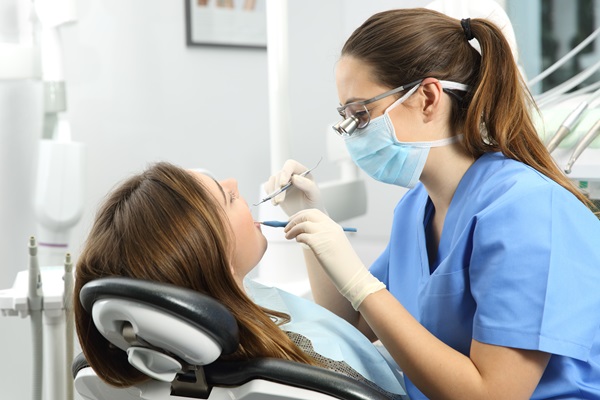What to Expect During a Dental Cleaning

A regular dental cleaning is vital for maintaining optimal oral health. While many people understand the importance of these appointments, the specifics of what happens during dental cleanings may remain a bit mysterious.
The dental cleaning process
In this review, we discuss the procedure of a typical dental cleaning, providing insight into the process and highlighting its significance in preventive oral care.
Greeting and preliminary assessment
A patient's dental cleaning journey begins with a warm greeting from the dental hygienist or dental assistant. Before the cleaning, they may conduct a brief assessment, checking for any changes in medical history, oral health concerns, or medication updates.
Dental X-rays (if necessary)
Dental X-rays may be taken to get a comprehensive view of the patient's oral health. X-rays can reveal hidden issues, such as cavities between teeth, bone loss, or impacted wisdom teeth. However, not everyone requires X-rays during every cleaning, and the frequency depends on individual factors and the dentist's recommendation.
Oral examination
The dental professional will conduct a thorough visual examination of the patient's mouth, gums, and teeth. They will look for signs of gum disease, cavities, oral cancer, and other potential concerns. This visual inspection is crucial for identifying issues that may require further attention.
Plaque and tartar removal
One of the primary goals of a dental cleaning is the removal of plaque and tartar. Plaque is a sticky film of bacteria that constantly forms on the teeth, and when it hardens, it becomes tartar or calculus. Specialized tools, including a scaler, are used to carefully remove these deposits from the surfaces of the teeth, especially in areas that may be difficult to reach with regular brushing and flossing.
Professional teeth cleaning
Following plaque and tartar removal, the dental hygienist uses a high-powered electric toothbrush and gritty toothpaste to do a thorough teeth cleaning. This process cleans and polishes the teeth and helps remove any residual plaque or stains.
Flossing
Flossing is an integral part of a dental cleaning. The dental professional will carefully floss between the teeth to remove any plaque or debris that may be lodged in those tight spaces. This step contributes to preventing cavities and gum disease in areas where a toothbrush may not reach effectively.
Fluoride treatment (if recommended)
Depending on the patient's oral health needs, the dentist may recommend a fluoride treatment. Fluoride helps strengthen tooth enamel, making it more resistant to decay. This treatment often entails applying gel, foam, or varnish to the teeth.
Discussion and education
Once the cleaning is complete, the dental professional may take the time to discuss their findings with the patient. This could include recommendations for improving their oral hygiene routine, advice on proper brushing and flossing techniques, and insights into any potential issues that they observed during the cleaning.
Next steps and follow-up
Based on the cleaning results and any additional findings, the dentist may recommend follow-up treatments, such as fillings, periodontal therapy, or further diagnostic procedures. They will also discuss the recommended frequency for the next dental cleaning, which is typically every six months for those with good oral health.
Contact us to schedule your next dental cleaning
If it has been more than six months since your last cleaning, do not hesitate to contact us. We can schedule a time for your next cleaning, along with a thorough inspection of your oral health overall.
Get more information here: https://www.presidentialdentalcare.com or call Presidential Dental at (215) 770-6489
Check out what others are saying about our dental services on Yelp: Dental Cleaning in Philadelphia, PA.
Related Posts
A dental cleaning is a simple and non-invasive dental procedure in which plaque and tartar accumulation is scaled away and the teeth and gum line are thoroughly cleaned and polished. There are several notable benefits of this preventive dental procedure that patients should understand. The benefits of dental cleaning include the ability to brighten and clean…
TMJ disorder, or temporomandibular joint disorders, refers to a group of issues related to mobility and discomfort around the jaw joints. The temporomandibular joints are the joints that link the lower jawbone (mandible) to the skull. More than any other joint in the body, these flexible joints are constantly in use, performing actions such as…
Brushing your teeth is one of the easiest and most effective things you can do to keep them healthy. It is an important part of your hygiene routine. It can be the difference between having a bright smile you can be proud of or ugly looking teeth you are reluctant to display.Simply brushing teeth every…
General dentistry services refers to the routine dental and oral care provided to patients of all ages. This type of care is necessary in order to help patients maintain good oral health, which can then translate to good overall health. One of the main parts of general dentistry is regular check-up appointments, which include cleanings,…
